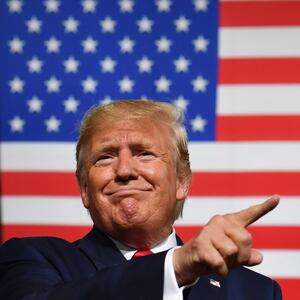Foreign Minister Javad Zarif said Sunday that Iran would not resume talks with President Donald Trump and his administration until a French plan to extend $15 billion of credit to Tehran goes into full effect.
“The credit we are talking about is not a charity. We are a wealthy nation,” Zarif told a group of reporters in New York on Sunday. “The credit is in lieu of the oil [the French] were supposed to buy.” Zarif said Iran is requesting the $15 billion credit be extended until December, at which point in time it would request $3 billion per month.
“That was one way for the French—not just the French but the European Union—in order for them to come back into compliance with the JCPOA,” Zarif said, referring the Iran nuclear deal. He said the U.S. would eventually “lose its leverage” if it continued to block Tehran from selling its oil.
“They are the ones who are dependent on the global market,” Zarif said.
Iran has been in conversations with French President Emmanuel Macron for weeks about the possibility of accessing billions of dollars from either the French central bank or the European Central Bank to compensate for the money Iran lost in oil sales due to American sanctions.
Zarif, who is in New York to attend the United Nations General Assembly, said the $15 billion deal was just one of several of the Iranian government’s demands for the European Union and the U.S. It also wants to be able to sell its oil and access the revenue made from oil sales. Zarif said the Trump administration’s sanctions campaign was “starving” the Iranian people and equated it to “economic terrorism,” saying Secretary of State Mike Pompeo should “be prepared to face the consequences in the International Criminal Court.”
On CBS’s Face the Nation on Sunday, Pompeo said: “I don’t know why anyone listens to the Iranian foreign minister. It’s beneath the dignity of anyone to listen to him.”
Since the early days of 2017, the Trump administration, with the help of hawkish Washington think tanks and politicos, has rolled out what it calls a “maximum-pressure campaign.” The policy relies almost entirely on the implementation of targeted economic sanctions on Iran’s most important leaders, sectors, and industries. The plan was in part crafted by former National Security Adviser John Bolton.
Following Bolton’s departure, it was unclear exactly how President Trump would move forward with Iran. He has long tried to avoid military confrontation with Iran, but members of his administration, notably Pompeo and Brian Hook, the special representative for Iran, have quietly lauded Bolton’s maximum-pressure campaign and aggressive attitude toward Tehran.
On Friday, the Trump administration announced that it had placed the Iranian central bank under the strictest of sanctions, making it almost impossible for France or any other country to extend it a line of credit. Trump called them the sanctions package the “highest sanctions ever”. Zarif blamed Mark Dubowitz, the CEO of Foundation for Defense of Democracies (FDD), a think tank in Washington that has been instrumental in the shaping of the Trump administration’s Iran policy.
“Mark Dubowitz wanted to make sure that neither this president or his successor will not be able to normalize relations with Iran,” Zarif said. “I think President Trump knowingly or unknowingly closed the door to negotiations on Friday.” In August, Iran blacklisted FDD, accusing it of “economic terrorism.”
“In America, think tanks research analyze and offer policy ideas. Elected officials and their deputies make the decisions,” Dubowitz said. “Mr. Zarif, having lived in America for so many years, might have been expected to be familiar with the customs of a free country. Apparently, he did not pay close attention. We will fully support normalization when the Islamic Republic of Iran acts like a normal nation and ends its support for terrorism and other destructive activities.”
Now, Zarif said, Iran is only going to agree to talks with the U.S. and the European Union if the cash starts flowing.
“When we went and discussed all of that and [France] thought—and we respect their decision but that does not relieve them of [their] legal obligations—that [they] needed to get some green light from the U.S.,” Zarif said. “That’s a contradiction because if the U.S. is interested in maximum pressure, then they wouldn’t give them a green light and that’s what we warned them about.”
The Daily Beast has previously reported that President Trump was considering the possibility of giving that green light to the French. But following the latest attacks on the Saudi oil facilities—described by Trump officials as “an act of war” on the part of Iran—Trump seems to have completely written off any idea of approving a deal that would benefit Tehran. Zarif flatly denied any accusations that Iran was involved in those attacks, pointing the finger instead at “the Yemenis.” Saudi Arabia is investigating the exact origin of the drones and missiles that were used in the attack.
“I think [Trump] is determined not to get involved in our country militarily,” Zarif said. “But there are others who are determined to drag him into a military conflict with Iran.”
Zarif said Iranian President Hassan Rouhani would introduce a plan, titled “Coalition for Hope,” at the United Nations this week. Although he did not provide reporters with the exact details, he said the coalition would include Iraq and other Persian Gulf countries should they choose to join and would focus on freedom of navigation and energy security.






